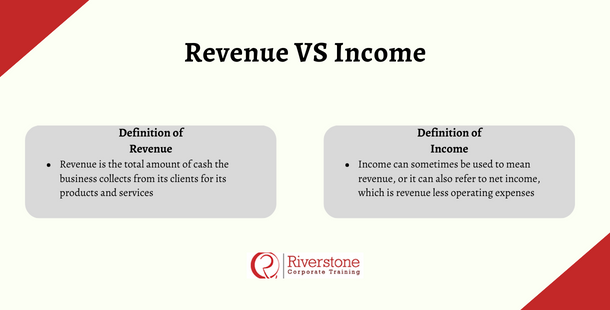Revenue VS Income
 Definition of Revenue
Definition of Revenue
“Revenue is the sales volume a company earns from providing services or selling products.”
Revenue is the total amount of cash the business collects from its clients for its products and services.
Definition of Income
Income can sometimes be used to mean revenue, or it can also refer to net income, which is revenue less operating expenses. For a business, income denotes net profit, i.e., what is left after costs and taxes subtracted from revenue.
For persons, however, “income” typically denotes the total salaries, wages, tips, rents, interest, or dividend received for a specific time.
Income calculated as:
Income = Revenue – Expenses
When income is characterized as a percentage of revenue, it’s called profit margin.
Types of Income
The term net income means, after all, expenses have been deducted.
Types of income include:
- Gross income before any expenses is deducted.
- Net income after all expenses are deducted.
Overview of Revenue vs. Income
Revenue is referred to as the total amount of income created by the company’s primary processes’ sale of goods or services. Payment is generally referred to as the top line because it stands at the top of the financial statement. The entire line denotes an enterprise’s revenues or gross sales. The revenue is the earnings a company creates before any expenditures are adjusted. Consequently, when a business has “top-line growth,” the enterprise feels an increase in gross sales.
Income, or net income, is a business’s total earnings or profit. When stockholders and analysts speak of a company’s income, they’re devoting it to net income or benefit for the organization. Net income is considered by taking revenues and deducting the costs of doing business, such as depreciation, interest, taxes, and other expenses.
Types of Revenue
Types of revenue include:
- The sale of goods, products, or merchandise
- Services, such as consulting, advisory, etc
- Rental income from commercial property
- Sale of tickets to a concert
- Interest income from lending
In accounting, the Income Statement, also called the Statement of Profit and Loss, summarizes a company’s revenues, expenses, and net income.


 Definition of Revenue
Definition of Revenue